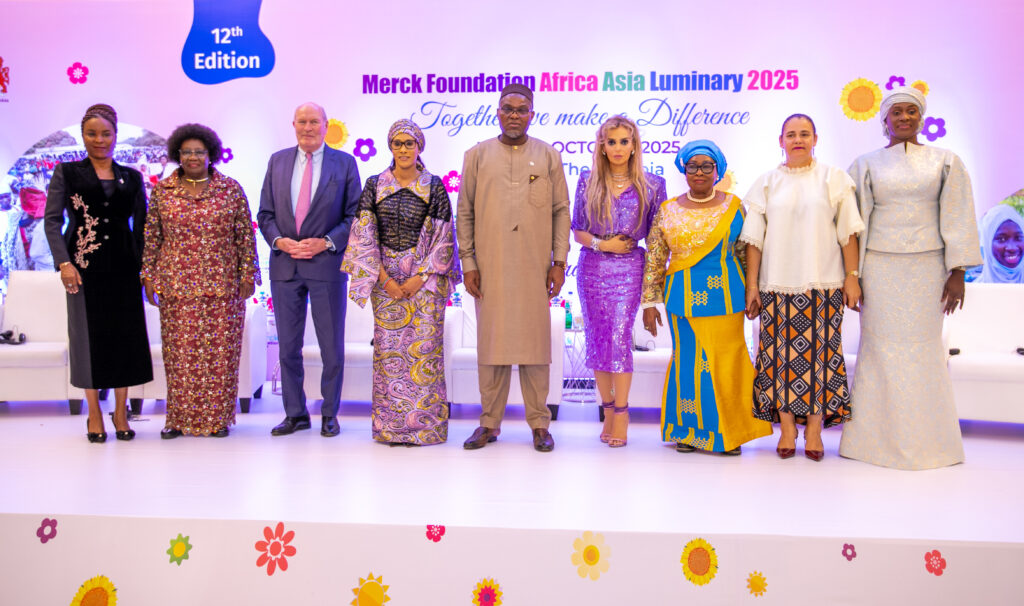The Chief Executive Officer of Merck Foundation, Senator Rasha Kelej, has reaffirmed the organisation’s commitment to transforming patient-care landscapes across Africa and Asia.
Speaking during the 12th Edition of the Africa Asia Merck Foundation Luminary held for the first time in The Gambia and graced by the country’s Vice President Mohammed B.S. Jallow, First lady Fotoumana Bah-Barrow, and seven first ladies from Africa, Dr Kelej highlighted the Foundation’s ongoing efforts to strengthen healthcare systems through education and capacity building.

“Together with African First Ladies, we are building a future where healthcare, education and dignity are accessible to all.” She said adding that every scholarship, every empowered woman, and every educated girl brings them closer to achieving that goal.
To realise this goal, she revealed that through partnerships with over 30 African First Ladies, the Foundation has awarded more than 2,400 scholarships to doctors and healthcare providers from 52 countries.
The Gambia alone has benefited from 94 scholarships, producing specialists who are now transforming care in the country.
According to Dr. Kelej, the Foundation’s initiatives have significantly improved access to specialised medical care in several African countries.
“Before our intervention, countries such as Burundi, Liberia, Sierra Leone had no specialists in key fields such as oncology, fertility or intensive care. Patients either had to travel abroad or had no access to treatment at all,” she explained.
In Kenya alone, the partnership’s impact is equally urgent.
According to Kenya’s latest Health Labour Market Analysis, the country has nearly 190,000 active health workers across 13 major health occupations, having doubled its health workforce over the last decade.
Still, Kenya’s health worker density, which includes doctors, nurses, midwives and clinical officers, remains far short of international targets at approximately 13.8 health workers per 10,000 people, compared with the World Health Organization (WHO) recommended threshold of around 44.5 per 10,000.
Addressing Africa’s healthcare workforce gap, Prof. Dr Stangenberg‑Haverkamp emphasised the urgent need to invest in human capacity to close these deficits.
“Africa bears 24 % of the global disease burden but has only 2.9 healthcare workers per 1,000 people,” he said, adding that the 2,400 scholarships from Merck Foundation are “critical for public health transformation.”
He further lauded Merck Foundation alumni for pioneering specialised healthcare in their respective countries.
“Many of our alumni are the first specialists in their nations, including Namibia, Malawi, The Gambia, Zimbabwe, Ethiopia and Bangladesh. They are the future experts and leaders of healthcare,” he added.
The First Lady of The Gambia, Mrs Fatoumatta Bah Barrow, commended the Foundation for its holistic approach to social impact, particularly in advancing women’s empowerment and education.
She highlighted the Foundation’s flagship initiative, Merck Foundation More Than a Mother, which continues to challenge infertility stigma, promote gender equality, and combat gender-based violence and harmful cultural practices such as female genital mutilation (FGM) and child marriage.
Mrs Barrow also noted that the Educating Linda programme provides scholarships to 40 high-performing but under-privileged girls per country annually.
“Educated girls become empowered women who transform communities,” she said.
Through education, empowerment, and long-term investment in people, Merck Foundation continues to redefine the future of healthcare across Africa and Asia, one specialist, one woman, and one girl at a time.
